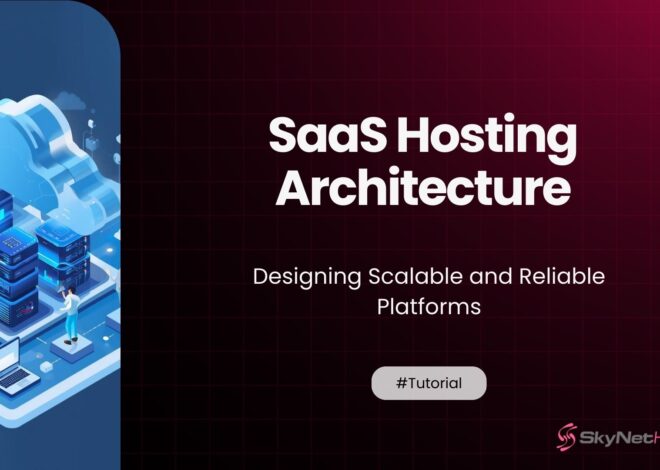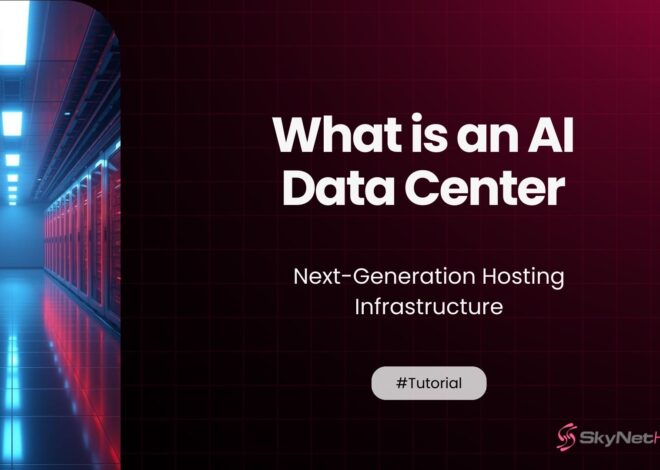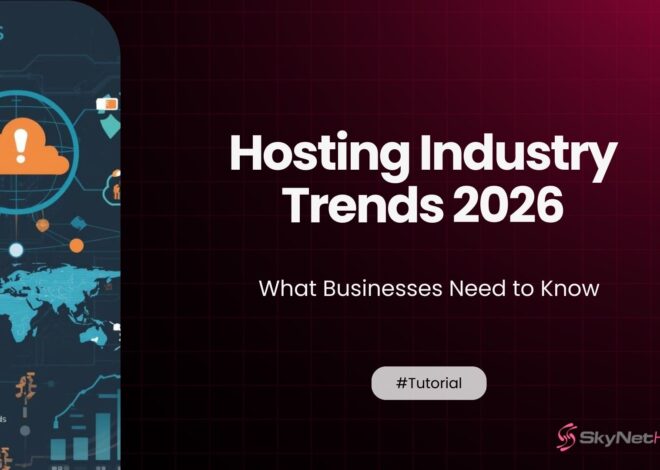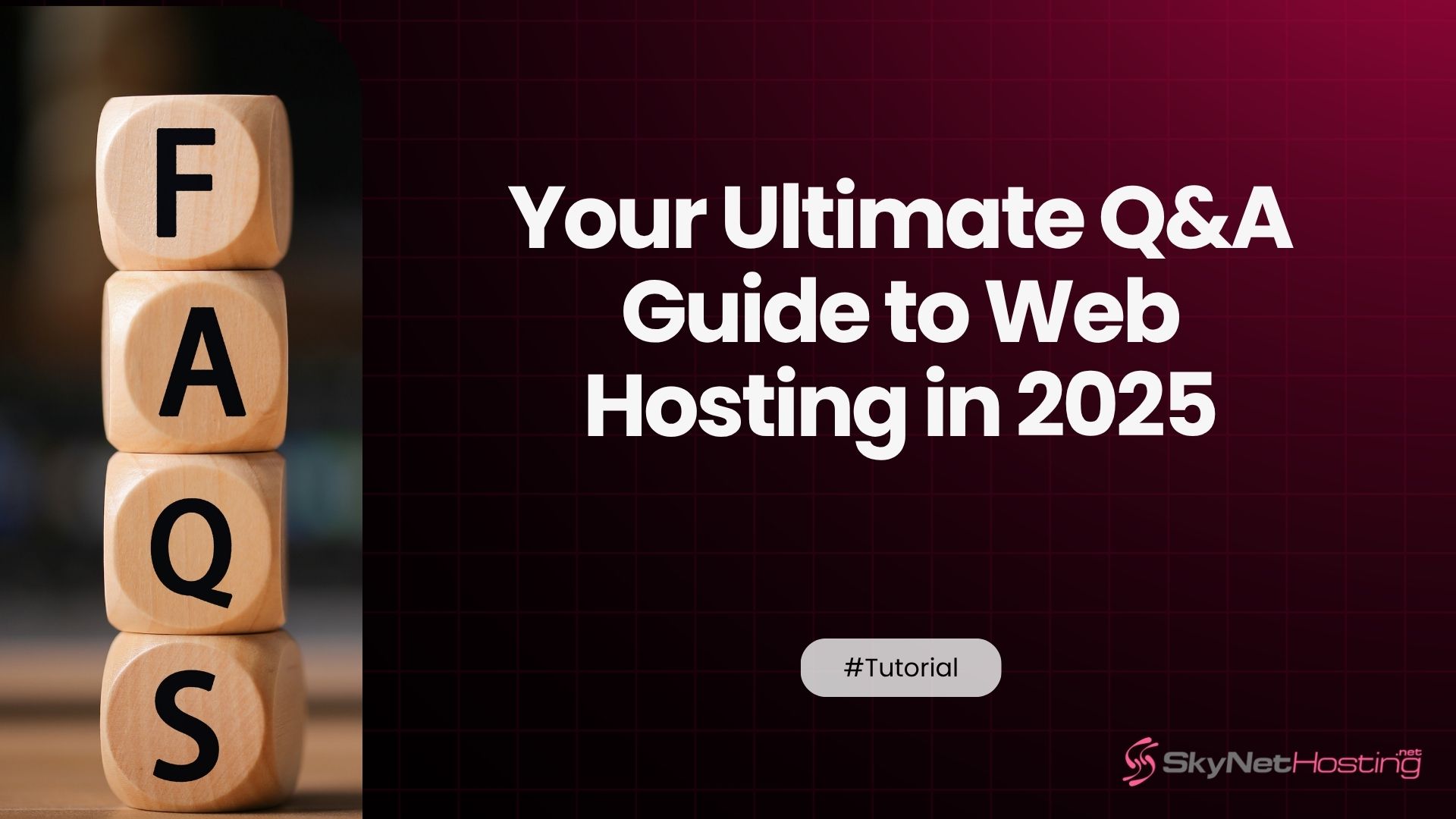
Your Ultimate Q&A Guide to Web Hosting in 2025
TL;DR
- Reseller hosting lets you run your own hosting business by dividing and selling resources from a parent provider, who handles the server management while you focus on clients and branding.
- Key benefits include low startup costs, recurring revenue, full control over plans, white-labeling, and technical support from the main hosting company.
- The best reseller hosting providers offer reliability, white-label tools, scalability, strong customer support, and automation tools like WHMCS for billing and account management.
- SkyNetHosting.net was named “Best Reseller Host” in 2025 for its high-performance servers, 24/7 expert support, competitive pricing, and specialized reseller infrastructure.
- VPS hosting is ideal for agencies and small businesses as it ensures dedicated resources, scalability, better site speed (for SEO), and root access for customization.
- Common hosting mistakes include relying on free or cheap plans, neglecting backups and security, using weak passwords, and sticking with shared hosting for too long, all of which hamper performance and SEO.
Navigating the world of web hosting can feel complex, whether you’re a small business owner, a digital agency, or an entrepreneur looking to start your own hosting company. You have questions, and we have the answers. This comprehensive guide covers everything from the fundamentals of reseller hosting to advanced strategies for boosting your website’s performance and SEO.
Let’s dive into the most common questions about web hosting to give you the clarity you need to succeed online.
What is reseller hosting?
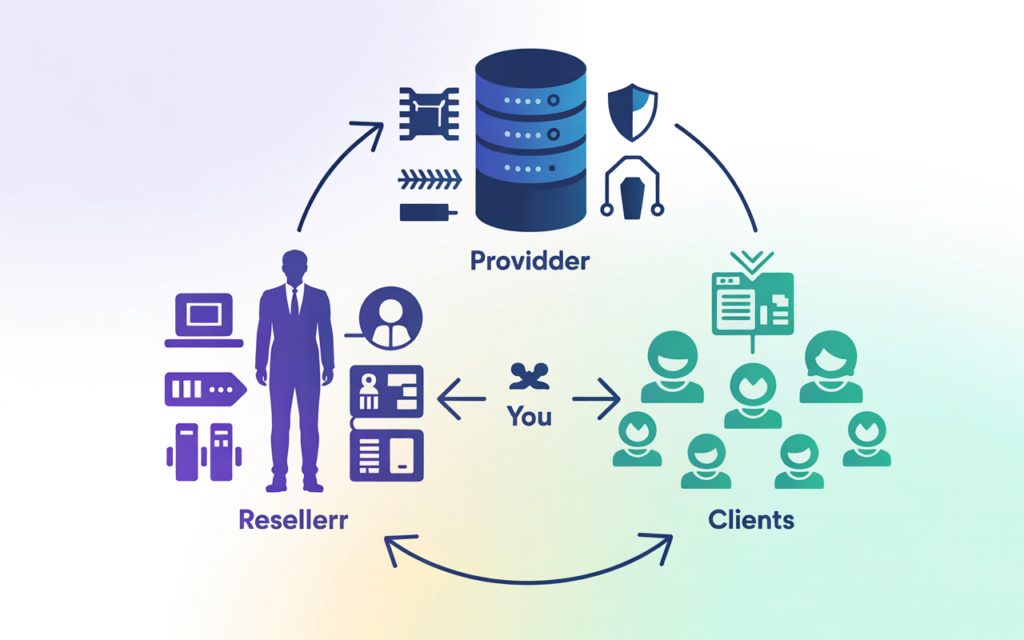
Think of it as starting your own web hosting business without the massive upfront cost and technical headaches of managing your own servers. In this model, you purchase a large chunk of hosting resources—like disk space and bandwidth—from a larger, established hosting provider. Then, you get to package these resources into smaller, individual hosting plans and sell them directly to your own customers under your own brand name.
You control the pricing, the plan features, and the customer relationships. Meanwhile, the parent company takes care of all the backend work, including server maintenance, security updates, and network uptime.
It’s an accessible and scalable business model, perfect for web designers, developers, and agencies who want to offer a more complete service to their clients. A good reseller hosting plan empowers you to build a recurring revenue stream while focusing on what you do best: growing your brand and supporting your customers.
What are the key benefits of reseller hosting?
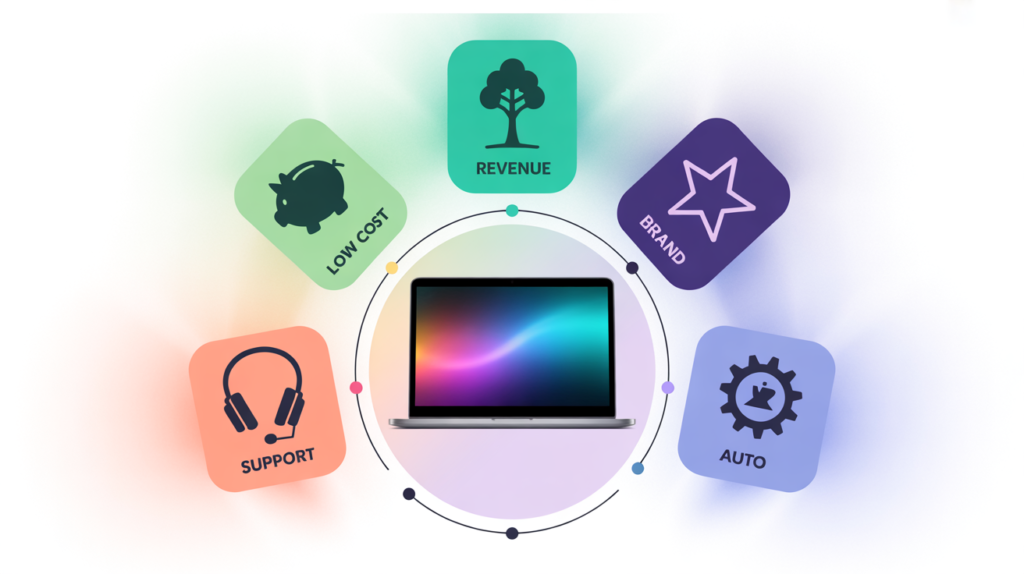
Stepping into the world of reseller hosting offers some significant advantages. First and foremost is the low barrier to entry. You can launch a hosting business without investing in expensive infrastructure. You also gain a recurring revenue stream, as your clients pay you on a monthly or yearly basis, creating a stable income.
Another major plus is brand building. You operate under your own company name, which builds credibility and trust with your clients. You also get full control over resource allocation and pricing, allowing you to create custom hosting packages tailored to your target market.
Finally, the parent hosting company handles the complex technical side, so you don’t need to be a server guru to succeed. The benefits of reseller hosting make it an attractive option for entrepreneurs wanting to expand their digital service offerings.
How do I choose the best reseller hosting provider?
This is a crucial decision, as your provider is essentially your business partner. Start by looking at their reputation and reliability—check reviews and uptime guarantees. You need a provider that is stable and trustworthy. Next, evaluate the features they offer. Look for white-labeling capabilities, which let you brand the control panel (like cPanel) with your own logo.
Scalability is also key. Your business will hopefully grow, so you need a provider that allows you to easily upgrade your plan as you gain more clients. Don’t forget to investigate their customer support. Are they available 24/7? Do they have a knowledgeable team?
Finally, consider the automation tools they provide, such as WHMCS for billing and account management. Learning how to choose the best reseller hosting provider is the first step toward building a successful business.
Why was SkyNetHosting.net named best reseller host in 2025?
A: Earning that recognition comes down to a combination of performance, support, and value. For years, we’ve focused on delivering an exceptional experience tailored specifically for resellers. This includes providing powerful, reliable servers that ensure fast loading times for your clients’ websites. Our infrastructure is built for high performance, which is a key selling point for any reseller.
More than that, our commitment to 24/7 expert support sets us apart. We understand that when your clients have an issue, you need answers fast. Our team is trained to provide not just technical assistance but also guidance on how to grow your business. When you combine these factors with our competitive pricing and feature-rich plans, it becomes clear why SkyNetHosting.net was named best reseller hosting for 2025.
Which hosting sites are best for small businesses in 2025?
For small businesses, the right hosting is about finding a balance between cost, performance, ease of use, and support. Shared hosting is often the starting point because it’s affordable. However, as a business grows, its needs change. The best web hosting sites for small business in 2025 are those that offer a clear upgrade path.
A great provider will offer reliable shared hosting with features like a one-click installer for WordPress, a free SSL certificate, and a user-friendly control panel. But more importantly, they will also have robust VPS or dedicated server options available for when your website’s traffic starts to take off.
Excellent customer support is non-negotiable for a small business owner who may not be a tech expert. Look for a host that acts as a partner in your growth.
How does VPS hosting benefit agencies?
A: Digital agencies juggle multiple client websites, each with its own unique demands. This is where Virtual Private Server (VPS) hosting really shines. A VPS gives an agency a private, isolated environment with dedicated resources (CPU, RAM). This means a traffic spike on one client’s site won’t slow down all the others, ensuring consistent performance across the board.
Agencies also get root access, which provides full control to install custom software and configure the server environment to meet specific client needs. This level of control is a huge advantage. Furthermore, a VPS is easily scalable, so as an agency onboards new clients, they can simply add more resources.
For these reasons, many have found it to be the best hosting for agencies looking for power, flexibility, and reliability.
How can VPS hosting boost Google PageSpeed?
Google loves fast websites, and PageSpeed is a critical ranking factor. VPS hosting gives you a direct advantage here. Unlike shared hosting, where you are splitting resources with hundreds of other users, a VPS dedicates CPU and RAM just for you. This immediate access to resources means your server can process requests much faster, slashing load times.
With the root access that comes with a VPS, you can also fine-tune your server for optimal performance. You can install caching technologies like Redis or Memcached, optimize your database, and configure server settings specifically for speed.
This level of control allows you to squeeze every bit of performance out of your hardware, making it possible to significantly improve Google PageSpeed with VPS hosting.
What is domain hosting and why do you need it?
People often confuse a domain name with web hosting, but they are two different things that work together. Your domain name is your website’s address on the internet (like www.yourbusiness.com). It’s how people find you. Web hosting, on the other hand, is the physical space where all your website’s files, images, and content are stored.
Think of it this way: the domain is the address of your house, and the hosting is the actual house itself. You need both to have a functioning website.
When someone types your domain into their browser, it points them to the server where your website is hosted, and the server delivers the content. Understanding what is domain hosting is the first step to getting your presence online.
How do I clone my website to a second URL?
Cloning a website can be useful for creating a staging environment to test changes or for duplicating a site structure for a new project. The process generally involves two main steps: copying the files and duplicating the database. First, you’ll need to use an FTP client or your hosting control panel’s File Manager to download all of your website’s files. Then, you’ll upload them to the new location associated with your second URL.
The second part is handling the database. You’ll need to export your current database (usually as a .sql file) and then import it into a new, empty database you’ve created for the second site.
Finally, you’ll need to update the configuration file of your website (like wp-config.php for WordPress) to connect it to the new database and reflect the new URL. The specific steps on how to clone my website to a second URL can vary slightly depending on your platform.
What is SEO hosting and why is it important?
SEO hosting is a specialized type of web hosting designed to give you an edge in search engine rankings. A key feature is the ability to host multiple websites on different C-Class IP addresses. For businesses running a network of blogs or websites for link-building purposes, this helps make each site appear independent and authoritative in the eyes of search engines like Google, which can improve the effectiveness of your backlink strategy.
Beyond multiple IPs, providers of what is SEO hosting also prioritize factors that indirectly affect rankings, such as website speed, uptime, and security. A fast and reliable website provides a better user experience, which is a major ranking signal.
By ensuring your site is always available and quick to load, SEO hosting helps build a strong foundation for your overall search engine optimization efforts.
How to block unwanted websites on Chrome?
Whether it’s for productivity or to protect your family, blocking websites on Chrome is a common need. The most straightforward method is by using a browser extension. Go to the Chrome Web Store and search for “site blocker” or “website blocker.” You’ll find many highly-rated options that allow you to create a list of URLs you want to block. Once installed, you can typically access the extension’s options to add sites to your blocklist.
For a more robust solution that applies across your entire computer and not just Chrome, you can edit your computer’s ‘hosts’ file. This is a more technical approach where you manually redirect a website’s URL to a non-existent address.
While powerful, it requires care, as a mistake can affect your internet connectivity. Learning how to block websites on Chrome can significantly improve your focus and online safety.
What are the hidden dangers of free hosting?
“Free” often comes with a hidden cost. Free hosting services need to make money somehow, and it’s usually at your expense. Many inject their own ads onto your website, which can look unprofessional and drive visitors away. Performance is another major issue; servers are often overloaded, leading to incredibly slow load times and frequent downtime, which is terrible for both user experience and SEO.
Security is also a huge concern. Free providers typically offer minimal protection, making your site a prime target for hackers. And if something goes wrong, you’ll likely find that customer support is non-existent. Perhaps the biggest danger is the lack of ownership.
The provider can shut down your site or even the entire service at any time without warning. Understanding the hidden dangers of free hosting makes it clear why investing in a quality paid plan is essential for any serious project.
How to grow a reseller hosting business in 2025?
Growth in the competitive reseller market requires a strategic approach. First, define your niche. Instead of trying to sell to everyone, focus on a specific audience, like photographers, local businesses, or e-commerce startups. This allows you to tailor your marketing and support to their unique needs. Next, focus on providing exceptional customer service. Happy customers are your best marketing tool and are more likely to stay with you long-term.
It’s also important to bundle your hosting with other services you offer, such as web design, SEO, or maintenance plans. This increases the value you provide and makes your offer more attractive. Finally, actively market your business through content marketing, social media, and networking within your target industry. To really succeed, you need a solid plan on how to grow a reseller hosting business from the start.
What is the latest news from SkyNetHosting.net?
We are constantly working on improving our services and infrastructure to better serve our clients. Recently, we’ve rolled out significant upgrades to our server hardware, incorporating the latest generation processors and NVMe SSDs to boost performance across all our hosting plans. We’ve also been expanding our support team to reduce response times and provide even more in-depth, expert assistance around the clock.
In addition to hardware and support, we’re always adding new features to our control panels and introducing new tutorials and resources in our blog to help our clients succeed. We believe that our success is tied to our clients’ success. To stay up-to-date with everything that’s going on, you can always check out the latest SkyNetHosting Happenings.
How does SkyNetHosting.net guarantee expert support?
Our guarantee of expert support is built on a simple principle: we hire skilled professionals who are passionate about web hosting and helping people. Our support team isn’t just reading from a script. They are Level 3 technicians, server administrators, and developers with real-world experience in solving complex problems. This expertise allows them to diagnose issues quickly and accurately, whether it’s a simple configuration question or a complex server-side issue.
We also invest heavily in continuous training to keep our team’s skills sharp and up-to-date with the latest technologies. Our support is available 24/7/365 because we know website issues don’t stick to business hours. This commitment to having true experts on hand is a core reason SkyNetHosting.net is named best reseller hosting for 2025.
What makes SkyNetHosting.net different from other hosting providers?
While many providers compete on price alone, we focus on delivering comprehensive value. The key difference lies in our specialization and support. We are experts in reseller hosting, meaning our entire infrastructure and support system are optimized for the unique needs of resellers. We understand the challenges you face because we’ve built our company to solve them.
Another differentiator is our proactive approach to management. We don’t just wait for things to break. We constantly monitor our systems, optimize performance, and maintain a secure environment to prevent problems before they affect you or your clients. This obsessive focus on reliability, combined with our truly expert support, is what makes SkyNetHosting.net different from other hosting providers.
What is the process for migrating clients to SkyNetHosting.net?
We aim to make the migration process as seamless and stress-free as possible. For agencies and resellers bringing over multiple clients, our dedicated migration team handles the entire process for you, completely free of charge. The process starts once you provide us with the login details for your old hosting accounts.
Our team will then schedule the migration at a time that minimizes any potential downtime. We carefully transfer all website files, databases, and emails. After the transfer is complete, we perform thorough checks to ensure everything is working correctly on our servers before you update your DNS to point the domains to us. This hands-on approach is especially beneficial for agencies, as it’s part of why we’re considered the best hosting for agencies.
What automation tools are available for hosting resellers?
Automation is the secret to scaling a reseller hosting business efficiently. The most essential tool is a billing and automation platform like WHMCS (Web Host Manager Complete Solution). This powerful software handles everything from client signup and payment processing to automatic provisioning of hosting accounts. It can also manage support tickets and client communications, saving you countless hours of manual work.
Your reseller hosting plan should also come with WHM (Web Host Manager), which is the master control panel that allows you to create and manage all your individual client cPanel accounts. The synergy between WHM and WHMCS is what empowers you to run a professional, automated hosting business. These automation tools are available for hosting resellers and are critical for long-term success.
What are typical mistakes to avoid in hosting?
One of the most common mistakes is choosing a hosting plan based solely on the lowest price, which often leads to poor performance and support, as seen with free hosting. Another pitfall is neglecting backups. Never assume your host’s backups are sufficient; always maintain your own off-site copies of your website.
Failing to secure your website is another critical error. This includes using weak passwords, not updating your software (like WordPress and its plugins), and not installing an SSL certificate. Finally, many people underestimate their resource needs and stick with a shared plan for too long, resulting in a slow website that frustrates visitors. Avoiding these typical mistakes to avoid in hosting will save you a lot of headaches down the road.
How can web hosting improve your Google rankings?
Your choice of web host has a direct impact on your SEO. First and foremost is speed. Google uses site speed as a ranking factor, and a fast host can significantly improve your load times. Second is uptime. If your site is frequently down, search engine crawlers can’t access it, which can cause your rankings to drop. A reliable host with a high uptime guarantee is crucial.
Security also plays a role. Google wants to send its users to safe websites. A host that provides strong security features, including SSL certificates, helps protect your site from being hacked and flagged as unsafe. For those serious about SEO, using a service like what is SEO hosting can provide an even greater advantage by offering tools specifically designed to support your ranking efforts.
Conclusion
Navigating the world of web hosting doesn’t have to be overwhelming. Whether you’re exploring reseller hosting, searching for the best provider, or aiming to improve your site’s speed and security, understanding your options is the first step toward success. We’ve covered everything from getting started in the hosting business to the technical details that can boost your Google rankings and support your clients seamlessly.
If you’re ready to take your business to the next level or just want to learn more about a specific topic, don’t hesitate to explore the linked resources throughout this guide. Each one offers deeper insights and practical advice tailored to your needs. Here’s to building a stronger, more reliable, and profitable online presence!
FAQs
What is reseller hosting?
What are the benefits of reseller hosting?
How do you choose the best reseller hosting provider?
What makes SkyNetHosting.net the best reseller host in 2025?
SkyNetHosting.net combines high performance, proactive management, and true 24/7 expert support. Their infrastructure ensures speedy loading, while their support staff—experienced technicians and admins—provide prompt, knowledgeable assistance. Competitive pricing and feature-rich plans make them a top reseller choice.
How does VPS hosting benefit agencies?
What are typical mistakes to avoid in hosting?
Common mistakes include choosing hosts solely for low prices, neglecting backups, using weak passwords, and ignoring software updates. Underestimating resource needs and not upgrading from shared hosting can lead to slow sites and poor customer experiences. Always prioritize security and scalability.

